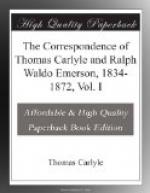books home; and are only in these weeks striving to
get one:* think of that! The worst is the sore
tear and wear of this huge roaring Niagara of things
on such a poor excitable set of nerves as mine.
The velocity of all things, of the very word you
hear on the streets, is at railway rate: joy
itself is unenjoyable, to be avoided like pain; there
is no wish one has so pressing as for quiet.
Ah me! I often swear I will be buried at least
in free breezy Scotland, out of this insane hubbub,
where Fate tethers me in life! If Fate always
tether me;—but if ever the smallest competence
of worldly means be mine, I will fly this whirlpool
as I would the Lake of Malebolge, and only visit
it now and then! Yet perhaps it is the proper
place after all, seeing all places are improper:
who knows? Meanwhile I lead a most dyspeptic,
solitary, self-shrouded life: consuming, if
possible in silence, my considerable daily allotment
of pain; glad when any strength is left in me for
working, which is the only use I can see in myself,—too
rare a case of late. The ground of my existence
is black as Death; too black, when all void too but
at times there paint themselves on it pictures of
gold and rainbow and lightning; all the brighter for
the black ground, I suppose. Withal I am very
much of a fool.—Some people will have me
write on Cromwell, which I have been talking
about. I do read on that and English subjects,
finding that I know nothing and that nobody knows
anything of that: but whether anything will
come of it remains to be seen. Mill, the Westminster
friend, is gone in bad health to the Continent, and
has left a rude Aberdeen Longear, a great admirer of
mine too, with whom I conjecture I cannot act at all:
so good-bye to that. The wisest of all, I do
believe, were that I bought my nag Yankee and
set to galloping about the elevated places here!
A certain Mr. Coolidge,** a Boston man of clear iron
visage and character, came down to me the other day
with Sumner; he left a newspaper fragment, containing
“the Socinian Pope’s denunciation of Emerson.”
--------- * The beginning of the London Library, a most useful institution, from which books may be borrowed. It served Carlyle well in later years, and for a long time he was President of it.
** The late Mr. Joseph Coolidge. ---------
The thing denounced had not then arrived, though often asked for at Kennet’s; it did not arrive till yesterday, but had lain buried in bales of I know not what. We have read it only once, and are not yet at the bottom of it. Meanwhile, as I judge, the Socinian “tempest in a washbowl” is all according to nature, and will be profitable to you, not hurtful. A man is called to let his light shine before men; but he ought to understand better and better what medium it is through, what retinas it falls on: wherefore look there. I find in this, as in the two other Speeches, that




